How to See Lower East Side Jewish Food & Street Art Tour
I love the Lower East Side. It is a rapidly changing area full of history, art galleries and street art. The Lower East Side Jewish food is the best. Old and New. Some people love this and some people hate how the area is changing. Gentrification. There is now a huge Whole Foods two blocks from Katz’s, Russ and Daughters and Yonah Shimmel Knishery. And Katz’s has become a tourist magnet. Join me as we take a Lower East Side Jewish Food & Street Art Tour.
Most people dash to Katz’s, wait for a long time, eat, and then dash off to the next place on their list. If you do this you will miss out on the full experience of the changing Lower Eastside and the intriguing Street Art tour.
First we need to start with a history of the Lower East Side.
Click here if you want to read about the Lower East Side Street Art Tour first
History of the Lower East Side
The Lower East Side’s first wave of European immigrants in the mid-1880s were German, and it became known as “Little Germany”. Then there was a period of Irish immigration. Followed by Italians and Eastern Europeans from Russia, Poland, Hungary Romania, the Ukraine and elsewhere. Immigrants tended to live in area populated by people from their own towns and countries.
My family came to this country from Russia and Romania in the early 1900s. Many people, including my family, were leaving Eastern Europe due to the increasing pogroms and violent attacks on Jewish communities. Between the 1880s and 1919, more than 2 million Jews immigrated to the US. One million settled in New York, a large number on the Lower East Side, but also in Brooklyn, the Bronx and Queens.
Boundaries of the Lower East Side
At that point in time, the Lower East Side was larger than we think of it now. It included what we now call the East Village, Nolita, Chinatown and the surrounding area. The Lower East Side was home to more than 5 million people, living in poverty and tenements. It was the most densely populated area in New York City.
Given me your tired, your poor, your huddled masses yearning to be free … Not
The US has always had a very conflicted approach to immigration. On one hand, there is the Statue of Liberty and the ideal that we welcome immigrants. There is a strong history of this country being built by immigrants. There is also a history of forced immigration and slavery. And, the genocide of the Native American people. The current criminalization of immigration that is taking place under President Trump (the separation of children from their families, the Muslim ban) are inhumane. Today’s actions have historical roots in US isolationism and protectionism that has been going on since the 1600s.
Way back in 1624, 23 Jews from Brazil came to New York City. Governor Peter Stuyvesant planned to turn them away but was convinced to let them enter New York (New Amsterdam at the time). In 1882, the Chinese exclusion act was passed and banned Chinese immigration to the US. It also required that Chinese living in the US carry identification or risk deportation. It was not repealed until 1943.
Immigration Act of 1924
The Immigration Act of 1924 restricted the number of Eastern Europeans that were allowed into the US. The quotas were set at 2% of the number of people from each country that were in the US as of 1890. Notice that this date was before the wave of immigration from Eastern Europe. From 1900-1915, on average 200,000 Italians immigrated to the US. The new quota set by the Immigration Act of 1924 for Italians was 4,000 per year. Asians of every nationality, including the Japanese, were banned from immigrating. The law stated that all of the Asian nationalities could not become citizens, therefore, they were ineligible to migrate.
Ever wonder why most Jews in Eastern Europe had a hard time coming to the US to escape the Holocaust? The reason is the Immigration Act of 1924 and US Policies on immigration. The 1924 quotas remained in place until 1952.
Lower East Side Jewish Food
Pastrami. Knishes. Chopped Liver. Schmaltz. Herring. Lox. Chubs. Pickles. Bagels. Bialys. Lower East Side Jewish Food. The tastes and food of Eastern Europe came to the US through immigrants. There were hundreds of Jewish Delis, knisheries, appetizers and other traditional shops on the Lower East Side. There were even more pushcart vendors.
Hester, Orchard, Essex, Norfolk, Suffolk, Ludlow were lined with thousands of pushcarts selling food, clothing, and all manner of goods and Jewish food.
Yonah Shimmel, Katz’s and Russ and Daughters are still standing. I love all of them. I am going to share some secrets to eating there like a native.
How to Eat at Katz’s Like a Native New Yorker
205 East Houston Street
Katz’s is an institution and has been in the same place since 1888. In my opinion, Katz’s has the best pastrami in the city. I used to stop there on the way to see my mother and bring her a sandwich. We like pastrami. They also have the staples of Lower East Side Jewish food: corned beef, tongue, salami, brisket, kishka, chopped liver, kasha and many other things. Katz’s is no longer kosher and you can also get cheese burgers and cheese steaks. The food is traditional Jewish Deli food. It is generally full of tourists. Here are some tips for a successful experience at Katz’s.
When to Go to Katz’s to Eat Jewish Food
- Do not ever go there on a weekend in the afternoon. On Saturday during lunch and afterwards, there is a line down the block.It will be at least an hour before you make it into the restaurant.
- Best time to go is during the week early or late in the morning BEFORE the lunch rush.
- I no longer even try to go if it is after 10:30 in the morning.
- Take the F train. Parking is terrible around there.
How to Order
It is chaos at Katz’s. Loud, crowded and fantastic. You can get overwhelmed if you have not been there before.
- You can eat at a table and get served. OR you can do it like a native and go up to the counter to order your sandwich. Each slicer has separate line so don’t just go to the first line that you see. Look for the shortest one. It won’t look like a line–it looks like a clump of people. Trust me, there are actual lines.
- Know what you are ordering as soon as you get to the slicer.
- The slicer will give you a plate with a few slices to taste.
- Make sure to tip the slicer. They are slicing meat for hours.
- There are separate lines for fries/drinks (on the left of the slicers as you face them). Knishes/kishka (stuffed derma–think Jewish sausage)/hot dogs/knishes are on the right of the slicers. If you have several people and want a number of things, split up and go to different parts of the counter.
- The sandwiches are very large and expensive ($22). Pay for extra slices of bread. I generally turn a pastrami sandwich into 2-3 sandwiches. It used to be free for extra bread, but now they charge $1. The benefit of sharing the sandwich is that you can try other things.
- The slicer will also ask you about pickles–they have sour and half sour. Sour is very sour.
- Whatever you do, DO NOT ask for mayo on your pastrami or corned beef sandwich.
- If you get it to go, there is a park nearby that you can eat it at.
- Enjoy the food. You can worry about cholesterol tomorrow.
Yonah Shimmel–the Best Knishes
137 East Houston
I love walking into Yonah Shimmel. It looks just like it did when it first opened in 1890. The knishes are baked in the basement and if you’re lucky, you see fresh knishes sent up in the dumbwaiter. The staff tends to be a bit gruff and it feels like I’m on the old Lower East Side. The knishes are round, not square (the square ones on the hot dog carts are from Gabila’s and originated in Coney Island).
I love the kasha knishes at Yonah Shimmel. I am a bit old school on knishes–basically I eat Kasha and potato. They now also make all kinds of knishes–broccoli, spinach, red cabbage, sweet potato and more. You can also order them to be delivered. I once sent a dozen kasha knishes to my mother in Florida. And, no, she didn’t share any with her friends. They also make very good egg creams. Egg creams are chocolate syrups and seltzer (there are no eggs in egg creams), borscht (cold beet soup), potato pancakes (with sour cream or apple sauce). They also have cheese blintzes, though my aunt said that Ratner’s (closed in 2002) were better.
Russ and Daughters–More than Lox
179 East Houston Street
Russ and Daughters is the baby in this family of Lower East Side Jewish Food institutions. It was started by Joel Russ, first with a pushcart and then a storefront. It has been open since 1914 (first around the corner) and is run by the 4th generation of the family. Russ only had daughters and they became his partners. Hence, Russ and Daughters instead of Russ and Sons.
Russ and Daughters is where I go for Fish. It is a take out place–there are no tables and there is often a line outside to get in on the weekend (not as long as Katz’s). Everyone knows about bagels and lox. There is much more to Jewish fish. Kippered salmon (my favorite), chubs, whitefish, sable, herring and more. There are also many different kinds of lox, varieties of bagel and bialys and types of cream cheese. They also sell dried fruit, nuts, chopped liver. Their chocolate Babka (a Jewish cake) is full of chocolate and is heavenly.
Go try some fish that you’ve never eaten before. And try a bialy or challah or some other kind of bread. You can’t go wrong at Russ and Daughters. The fourth generation is now branching out and they’ve opened a cafe at 127 Orchard Street which had traditional as well as modernized versions of Jewish food. And, they have another cafe in the Jewish Museum.
Next Up–the Street Art Tour on Lower East Side
Street Art Tour of the Lower East Side
After you’ve had your fill of Jewish food, you are going to need to walk it off. There is a lot of street art on and around Houston Street. Some of it is well known and others are local graffiti artists having their say on the walls of the city. The most well-known area is the Center-fuge Outdoor Street Art gallery. There was a work by Banksy that was recently painted over. Everywhere you walk, you’ll find street art.
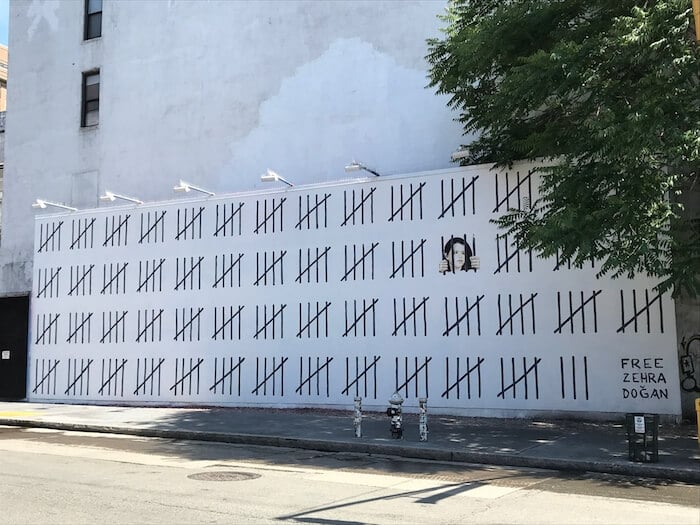
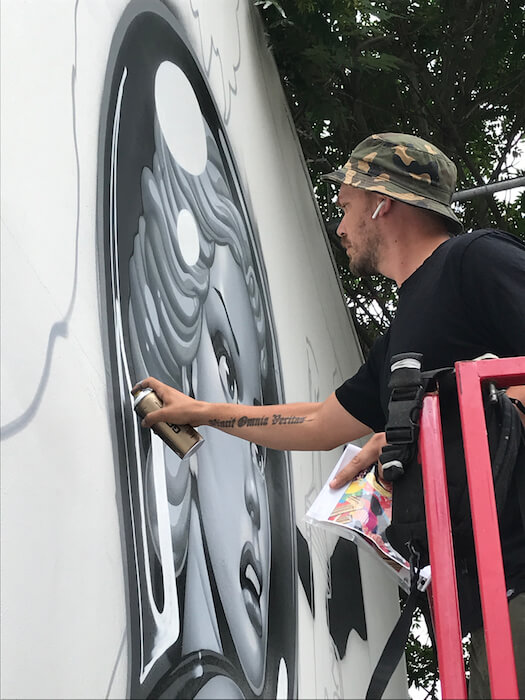
Banksy Mural
Banksy is a famous and illusive street artist. Until recently, he had a mural on Houston and Bowery of Turkish artist Zehra Dogan who have been imprisoned in Turkey for painting a picture of a the Kurdish town of Nasyabin which was destroyed by the Turkish government’s army. She was sentenced to 2 years and 9 months in year (she’s still in jail). In 1982, The Bowery Wall began 30 years ago with a mural by Keith Haring and many different artists have painted the wall since then.
Banksy’s mural was painted over in June. The new mural is by Tristan Eaton. If you want to see Banksy in NYC, there is a long standing piece by him on 79th and Broadway on the Upper West Side near Zabars (another famous Jewish deli in NYC).
Centre-fuge Public Art Project
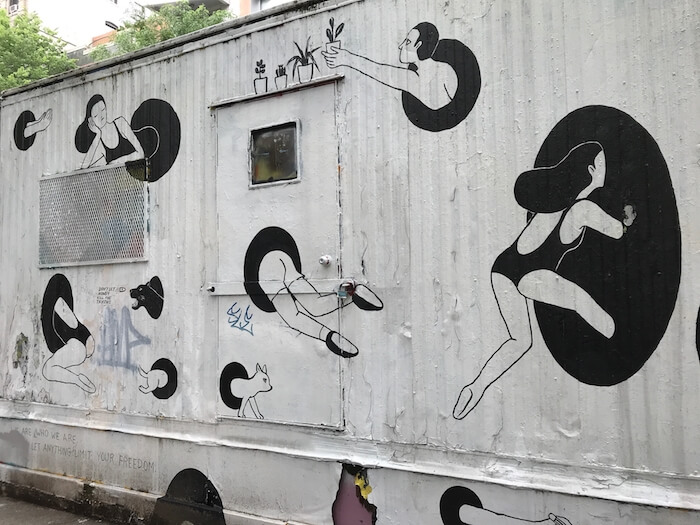
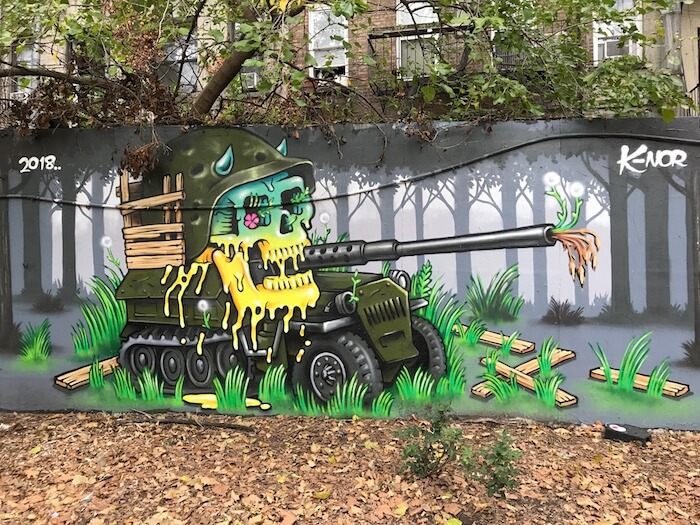
The Centre-Fuge Public Art project is an outdoor art gallery on First Avenue and First Street. You can go into the park and see the art work up close. Don’t forget to walk around to first street to see the construction trailer that they painted with murals. There are murals all over First Street between First and Second avenues.
Street Art Tour Everywhere
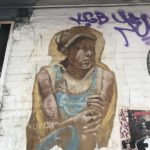
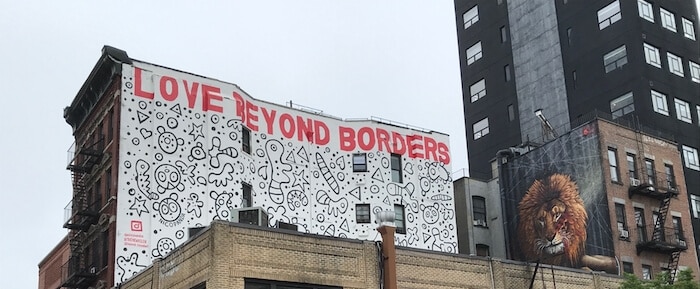
My favorite thing to do is to wander the City on the look out for street art. Do this in the blocks south of Houston in this area and you’ll be rewarded with lots of interesting graffiti, murals and street art. The process of discovery is exciting. This could also be a very good activity with children and teenagers.
Interested in Street Art? Jersey City has great Street Art. You Might consider a day viewing Jersey City Street Art
Or, go to Bushwick, Brooklyn to see Street Art
Here’s an interview with street artist and activist LMNOPi. You can see her work in Bushwick and read about my interview with her.
Or maybe Hungary: Best of Budapest 4 Day Itinerary
Art Galleries on the Lower East Side
There are also many art galleries on the Lower East Side. You could make a day of it–breakfast at Russ and Daughters, street art, lunch at Katz’s or Yonah Shimmels and Galleries in the afternoon. The Galleries in far west Chelsea are closed on Sundays but the Lower East Side Galleries are open. The art tends to be more edgy. I have been to the galleries many times and often have run into the artist or owner at a gallery.
Some galleries that are within a few blocks of Houston and Second are: Anatasia Photo (143 Ludlow), Krause Gallery (159 Orchard), Danziger (95 Rivington) and Chuchifritos Gallery (120 Essex). I recommend that you google the gallery first to find out about the current exhibition.
How to Get There
The F subway stops is called 2nd Avenue (and E. Houston Street). Walk a few blocks east and you will first see Yonah Schimmels, then Russ and Daughters and then Katz’s.
If you want to learn more about the history of the Lower East Side Jewish Food, Street Art or New York City? Consider purchasing one of these books:





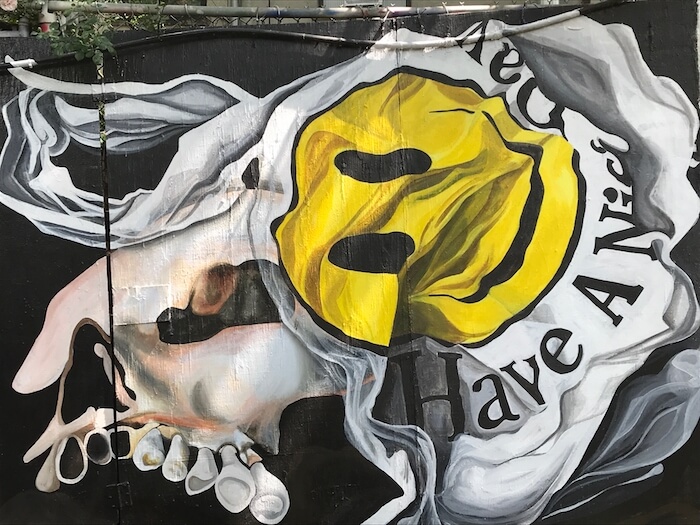
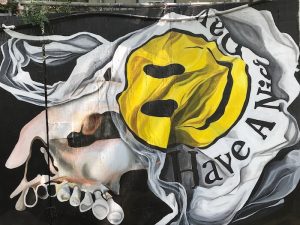
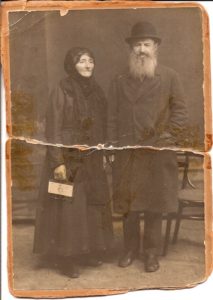
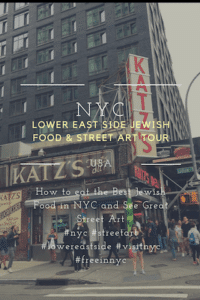
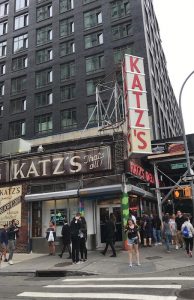
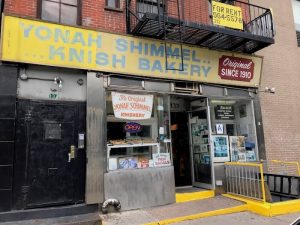
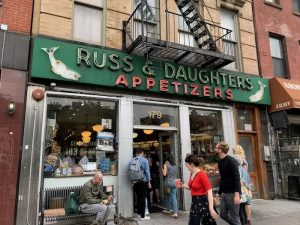
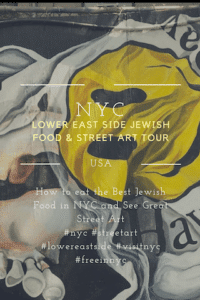
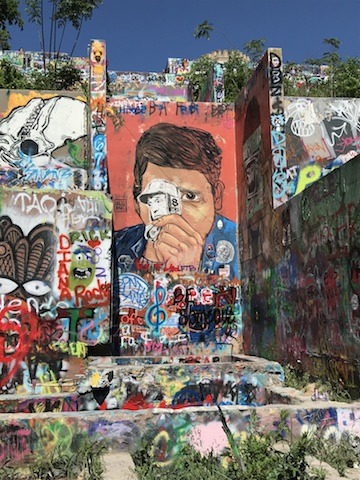
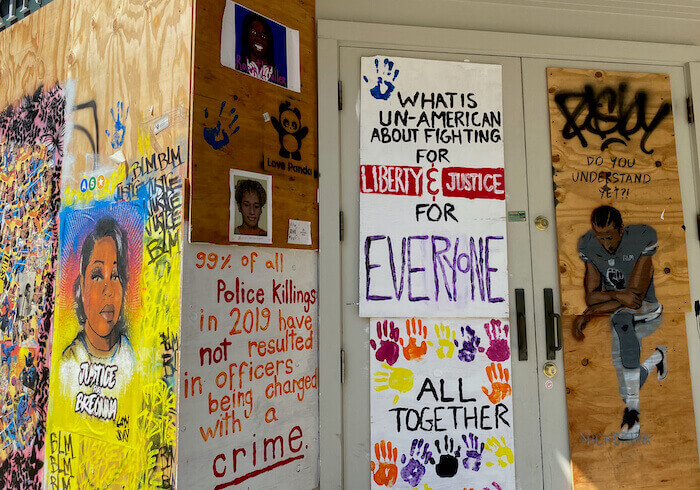
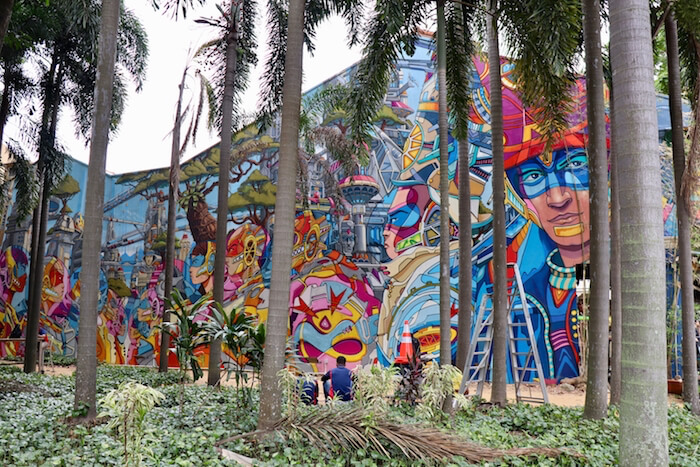
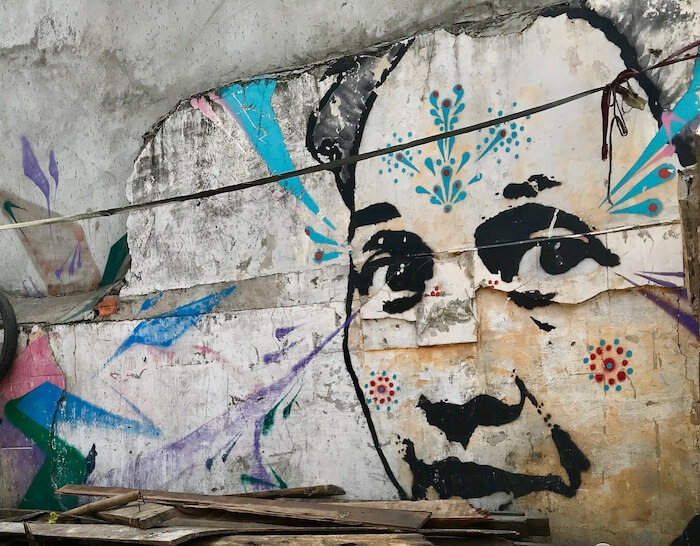
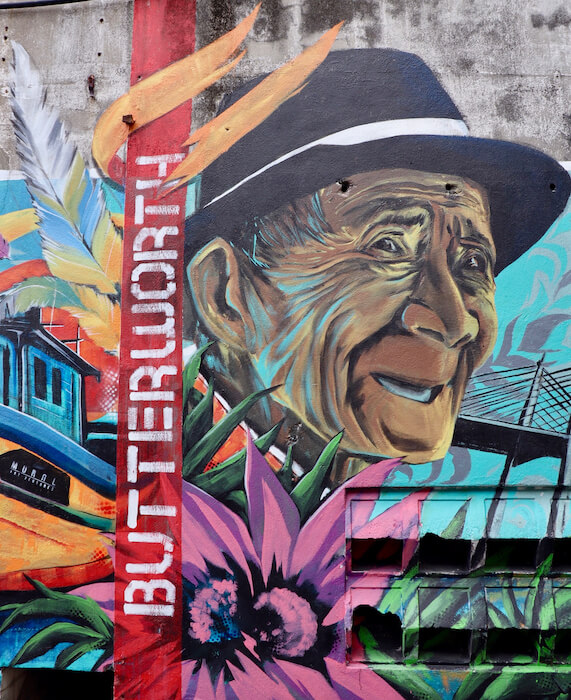
We saw fabulous street art in Łodz in Poland, where our intrigue about the Jewish population is growing each week we stay in this beautiful country.
Very detailed! Love it! One question…why no mayo? I love mayo 🙁
It’s mainly cultural tradition. Jews in Eastern Europe didn’t eat mayo. They ate mustard. Some people think it is because it’s not kosher–but that’s not true.
I love street art and will be in New York in September, so something for my future travel notice. Thanks for sharing!
Hi Sue,
Your site is wonderful. Bringing to it your personal/political world view is unique and enlightening-not the usual travel guide fare! I once took a walking tour in the Marais in Paris and the tour guide infused it with her progressive/humanistic take and it made all the difference. It brought the area to life – both its very tragic and celebratory times – as you’re doing.
Do you write them all by personally exploring each area – or do you also read up on stuff?
Thanks!
June
Such a detailed post! Love the street art. And all the yum food descriptions!
Thanks! Glad it was helpful
I love wandering around the LES and look at the street art.
Thanks! Me too
The street art is really something! I recently went on a few graffiti tours in Colombia and it was amazing to learn how much the graffiti means…it’s beautiful and interesting but has so much depth to it for the locals. Would love to see this street art and compare.
Thanks and hope you come see it.
When I read the list of Jewish foods and realize I don”t recognize most of them. Oops. I guess there aren’t that many Jewish people for me to be exposed to in Hawaii.
Interesting. Well I think you’ll need to come to the east coast and try some of the food.
I love street art (especially in Berlin!) and I’m visiting NYC in October so this info is really handy… thank you for sharing!
Thanks. Glad it’s helpful. There’s great street art all over the city
Man I’ve been wanting to go to Russ and Daughters ever since I heard a podcast on it. In the meantime, been heading to Delis around SF!
I love Russ and daughters!
Some day I’ll go to New York to eat some of the Jewish deli food at the institutions you describe so beautifully. Are there any that are kosher?
Yes. I’d check first. 2nd ave deli is still kosher. It’s no longer in 2nd ave. It’s on 33rd so not close to the lower east side
I love street art and murals, too. And I’m pretty sure I don’t know what any of that food is, haha. It sounds great, but I’d be so overwhelemed, I think!
Thanks. And Tobago Schumer’s isn’t as overwhelming. There’s also a lot of other places in the nieigjbirhood
This is probably the first detailed and practical guide for Lower East Side I’ve ever read! NYC is my dream destination and when I cross it off my bucket list, this neighbourhood will be a must visit on my list!
Thanks for you comments. The Lower East Side is a great place to visit. At some point, I’m going to do part 2 because there are other great places to see in the LES.
I would love to try some jewish food, I dont think I have ever tried it, so I am definatly adding that to the list of things try out 🙂